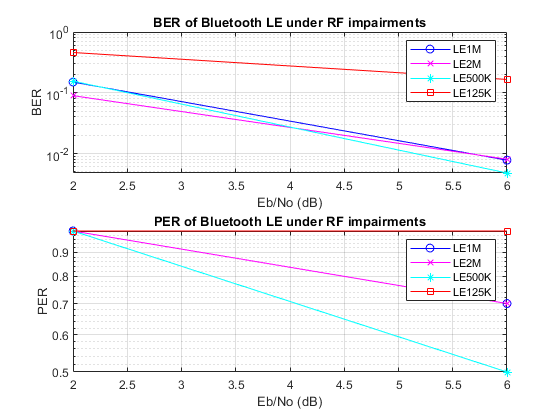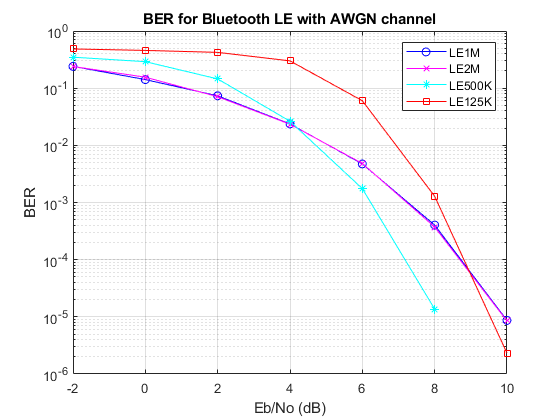End-to-End Simulation
Bluetooth® Toolbox features and reference examples enable you to model end-to-end communication links and analyze the link-level performance of the Bluetooth basic rate/enhanced data rate (BR/EDR) and low energy (LE) communication systems.
Use the end-to-end simulation capabilities of the toolbox to:
Perform end-to-end Bluetooth BR/EDR and LE simulation and evaluate the performance in the presence of radio frequency (RF) impairments, path loss, WLAN and 5G New Radio (NR) interference.
Compute the packet error rate (PER) and BER values for the Bluetooth BR/EDR and LE waveforms.
To explore features and examples related to RF impairments and corrections, see RF Component Modeling.

Functions
bluetoothWaveformGenerator | Generate Bluetooth BR/EDR PHY waveform |
bluetoothIdealReceiver | Decode Bluetooth BR/EDR PHY waveform |
bleWaveformGenerator | Generate Bluetooth LE PHY waveform |
bleIdealReceiver | Decode Bluetooth LE PHY waveform |
bluetoothPathLoss | Estimate path loss between Bluetooth BR/EDR or LE devices (Since R2022b) |
Objects
bluetoothWaveformConfig | Bluetooth BR/EDR waveform generator configuration parameters |
bluetoothPhyConfig | Bluetooth BR/EDR PHY configuration parameters |
bluetoothFrequencyHop | Bluetooth BR/EDR channel index for frequency hopping |
bluetoothPathLossConfig | Bluetooth BR/EDR or LE path loss configuration parameters (Since R2022b) |
Topics
- Add RF Impairments and Fading Channel Model to Bluetooth LE Waveform in an Indoor Environment
Use the Bluetooth waveform generation and channel modeling capabilities to generate a Bluetooth LE waveform and distort it by adding RF impairments and fading channel model.
- Generate and Attenuate Bluetooth BR/EDR Waveform in Industrial Environment
Use the Bluetooth PHY modeling capabilities to generate and attenuate Bluetooth BR/EDR waveform in an industrial environment.







